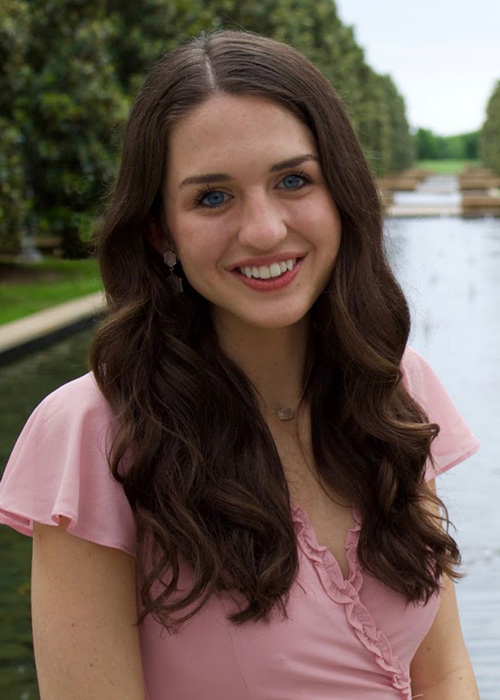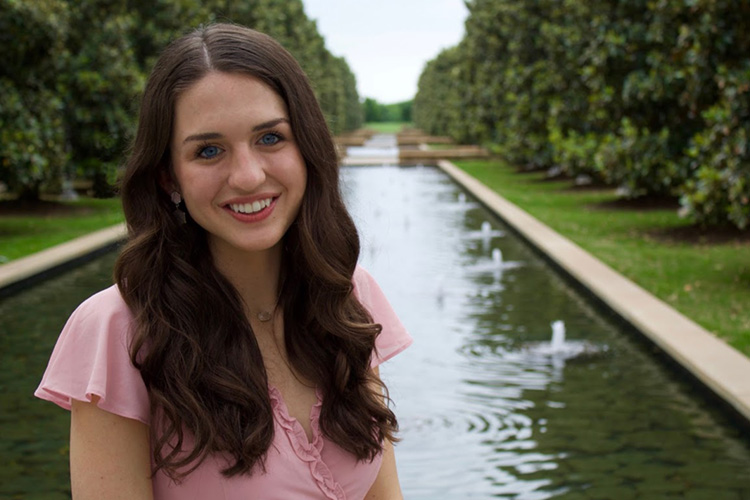
Lilly Lewis always knew she wanted to pursue a career in health care, but it wasn’t until she participated in a leadership program sponsored by Citizen Potawatomi Nation (CPN) that she focused her sights on providing care in tribal clinics.
Lewis, a neuroscience student at The University of Texas at Dallas and a member of CPN, is one of 55 national winners of the 2021 Udall Scholarship. The Morris K. Udall and Stuart L. Udall Foundation, established by Congress and named for the former congressmen and brothers, awards scholarships, fellowships and internships in fields related to the environment and to American Indians and Alaska Natives in fields related to health care and tribal public policy.
This year’s group of Udall Scholars was selected on the basis of commitment to careers in these fields, as well as leadership potential, record of public service and academic achievement. Each scholarship provides $7,000 for the student’s junior or senior year of academic study.
Lewis said as a student at UT Dallas, she was seeking an “aha!” moment in determining what her career path would be, and the time she spent at a tribal clinic was inspiring. Her family’s experience receiving health care in a tribal clinic also made applying for the scholarship meaningful.
“Throughout the summer after my freshman year in college, I participated in the CPN leadership program, which was an incredible experience. I learned how my tribe is different from other tribes and how access and quality of care differ,” Lewis said. “CPN is really going above and beyond and providing health care professionals who are really engaged with the community.”
“A medical professional who understands that these health care practices can coexist and incorporates them into their practice can really improve the quality of care for Native American people. I specifically want to work in my tribal clinic and provide the perspective of someone who is part of the community.”
Lilly Lewis, a neuroscience senior at UT Dallas and 2021 Udall Scholar
During the program, she learned that the worlds of modern medicine and traditional Native American health care don’t have to exist separately.
“A medical professional who understands that these health care practices can coexist and incorporates them into their practice can really improve the quality of care for Native American people,” Lewis said. “I specifically want to work in my tribal clinic and provide the perspective of someone who is part of the community.”
Lewis is a senior in the School of Behavioral and Brain Sciences and plans to continue her education and pursue a career as a physician assistant — a choice that she said will provide her with a broader capacity to serve tribal communities.
At UT Dallas, Lewis has served as a first responder on the University Emergency Medical Response team, where she drew on her empathy and understanding as a college student to assist fellow students during crises.
“Lilly has also been helping to build greater community awareness on UTD’s campus of the Native American people in the North Texas region. With her campus involvement and activism, I am confident she is helping prepare for further Native American scholarship applicants to come here, too.”
Dr. Douglas Dow, associate dean of the Hobson Wildenthal Honors College at UT Dallas
“I feel that my perspective serving fellow students helps me provide better care. On campus, that can mean understanding what college students who are experiencing panic attacks during finals feel like and being able to relate to them and make them comfortable,” Lewis said.
Lewis also serves as an officer in the UT Dallas chapter of the American Medical Women’s Association and is the founding president of UT Dallas’ Native American Student Association.
Dr. Douglas Dow, associate dean of the Hobson Wildenthal Honors College and director of the Office of Distinguished Scholarships, said Lewis is the first Udall recipient from UT Dallas in the category of Native American health policy.
“While applications by students seeking careers in environmentalism numerically dominate the Udall application field, recognizing applicants seeking to spend their careers in Native American public policy, tribal governance and health care has always been a central aspect of the Udall Foundation’s mission,” he said. “Lilly has also been helping to build greater community awareness on UTD’s campus of the Native American people in the North Texas region. With her campus involvement and activism, I am confident she is helping prepare for further Native American scholarship applicants to come here, too.”
